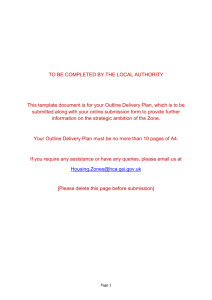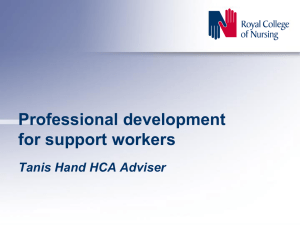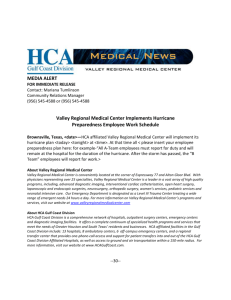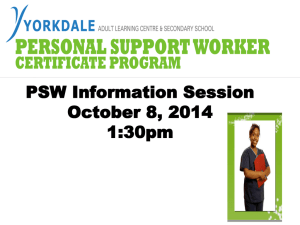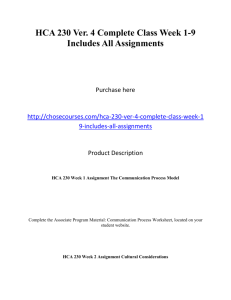Bowel Bladder Continence- December 15, 2011
advertisement
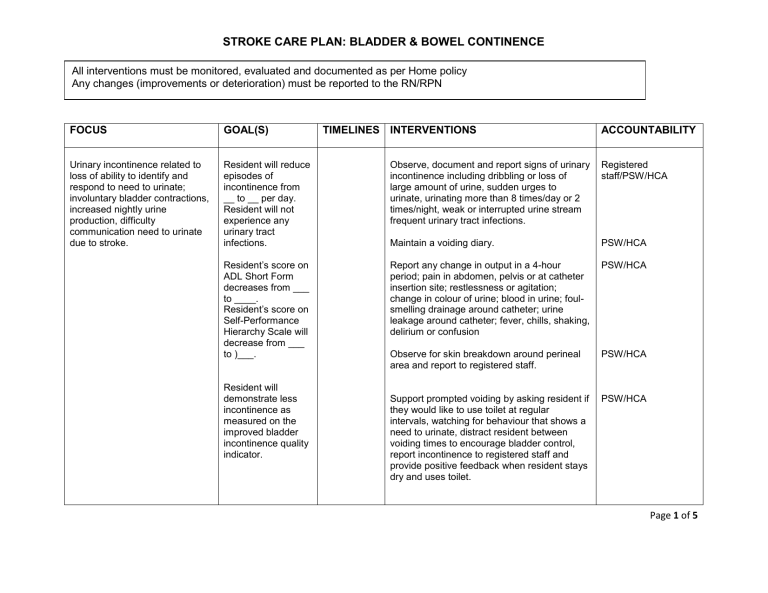
STROKE CARE PLAN: BLADDER & BOWEL CONTINENCE All interventions must be monitored, evaluated and documented as per Home policy Any changes (improvements or deterioration) must be reported to the RN/RPN FOCUS GOAL(S) Urinary incontinence related to loss of ability to identify and respond to need to urinate; involuntary bladder contractions, increased nightly urine production, difficulty communication need to urinate due to stroke. Resident will reduce episodes of incontinence from __ to __ per day. Resident will not experience any urinary tract infections. Observe, document and report signs of urinary incontinence including dribbling or loss of large amount of urine, sudden urges to urinate, urinating more than 8 times/day or 2 times/night, weak or interrupted urine stream frequent urinary tract infections. Registered staff/PSW/HCA Maintain a voiding diary. PSW/HCA Resident’s score on ADL Short Form decreases from ___ to ____. Resident’s score on Self-Performance Hierarchy Scale will decrease from ___ to )___. Report any change in output in a 4-hour period; pain in abdomen, pelvis or at catheter insertion site; restlessness or agitation; change in colour of urine; blood in urine; foulsmelling drainage around catheter; urine leakage around catheter; fever, chills, shaking, delirium or confusion PSW/HCA Observe for skin breakdown around perineal area and report to registered staff. PSW/HCA Support prompted voiding by asking resident if they would like to use toilet at regular intervals, watching for behaviour that shows a need to urinate, distract resident between voiding times to encourage bladder control, report incontinence to registered staff and provide positive feedback when resident stays dry and uses toilet. PSW/HCA Resident will demonstrate less incontinence as measured on the improved bladder incontinence quality indicator. TIMELINES INTERVENTIONS ACCOUNTABILITY Page 1 of 5 STROKE CARE PLAN: BLADDER & BOWEL CONTINENCE Urinary incontinence related to vision problems (cannot find way to bathroom), decreased mobility (cannot get to bathroom independently or quickly enough), decreased motor coordination (cannot mange clothing, briefs, transfers or toilet) due to stroke. Resident will reduce episodes of incontinence from __ to __ per day. Resident’s score on ADL Short Form decreases from ___ to ____. Resident’s score on Self-Performance Hierarchy Scale will decrease from ___ to )___. Set bladder retraining schedule. Registered Staff Follow bladder retraining protocol by prompting resident to urinate as scheduled, reminding resident to practice pelvic floor exercises. PSW/HCA Check that all assistive devices and equipment are in place and secure before toileting (specify the assistive devices required) PSW/HCA Provide positive feedback throughout the process and provide cueing / assistance as required. PSW/HCA Educate resident/family on urinary incontinence and interventions. PSW/HCA/Registered Staff Position the individual on toilet/commode in position that will help with toileting. Have resident sit leaning forward with feet flat on floor or on stool. PSW/HCA Position resident on bedpan with head of bed raised as upright as possible. PSW/HCA Orient resident to location of toilet, commode, bedpan, urinal. PSW/HCA Keep path to bathroom clear of any obstacles and that is lighted at night. PSW/HCA Assist resident to adhere to toileting schedule through prompting and/or assistance with mobility and clothing. PSW/HCA Page 2 of 5 STROKE CARE PLAN: BLADDER & BOWEL CONTINENCE Urinary retention related to loss of urge to urinate due to stroke Risk of urinary tract infection related to indwelling catheter due to stroke. Resident will not experience urinary retention. Resident will not experience any urinary tract infections. Ensure that all assistive devices and equipment are in place and secure before toileting (specify the assistive devices required) PSW/HCA Educate resident/family on urinary incontinence and interventions. PSW/HCA/Registered Staff Assess for full bladder and contact physician as necessary. Registered Staff Reassessment of medications that may contribute to urinary retention. Registered Staff Report to registered staff if resident unable to pass urine for 4 hours (excluding nighttime), has fever, complains of lower back or abdominal pain. PSW/HCA Educate resident/family on urinary retention and interventions. PSW/HCA/Registered Staff Offer resident drinks 6 to 8 cups of fluid per day. Limit caffeinated drinks to 2 cups/day. PSW/HCA/Dietary Offer cranberry juice. PSW/HCA Check that drainage bag is positioned below level of bladder. PSW/HCA Position catheter tubing so it does not kink or pull on catheter. PSW/HCA Secure catheter tubing to resident’s leg. PSW/HCA Page 3 of 5 STROKE CARE PLAN: BLADDER & BOWEL CONTINENCE Constipation related to weakened rectal muscles due to stroke. Resident will not experience constipation. Empty urinary drainage bag every 8 hours. PSW/HCA Report any change in output in a 4 hour period; pain in abdomen, pelvis or at catheter insertion site; restlessness or agitation; change in colour of urine; blood in urine; foulsmelling drainage around catheter; urine leakage around catheter; fever, chills, shaking, delirium or confusion. PSW/HCA Educate resident/family on urinary tract infection and interventions. PSW/HCA/Registered Staff Observe document and report signs of bowel problems such as constipation, abdominal pain, rectal bleeding, liquid stools, constant straining with bowel movements, fever, weight loss or no bowel movement in at least 3 days. PSW/HCA Maintain a record of all bowel movements. PSW/HCA Maintain a record of diet and fluid intake. PSW/HCA Observe for skin breakdown around perineal and rectal area and report to registered staff. PSW/HCA Assist resident to participate in activities that are of interest. PSW/HCA Adjust diet to reduce or treat constipation. Dietary Document a routine toileting schedule. Registered Staff Assist resident to adhere to toileting schedule through prompting and/or assistance with mobility and clothing. PSW/HCA Page 4 of 5 STROKE CARE PLAN: BLADDER & BOWEL CONTINENCE Position the individual on toilet/commode/bedpan in position that will help with toileting. PSW/HCA Educate resident/family on constipation and interventions. PSW/HCA/Registered Staff Page 5 of 5
